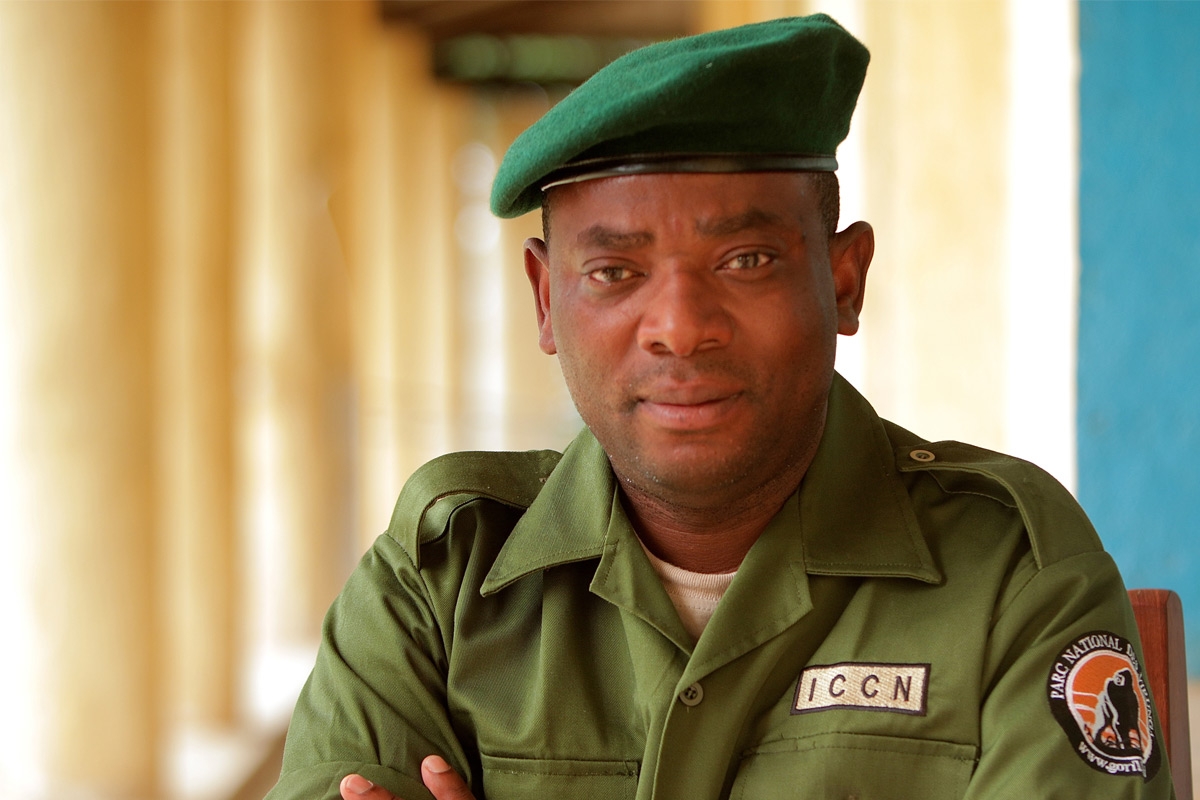Rodrigue Katembo: ranger, activist, and ex-child soldier
July 31, 2017

Rodrigue Katembo risked his life to expose the corruption behind illegal oil exploration in Virunga National Park, Democratic Republic of the Congo. Earlier this year, he was awarded the Goldman Environment Prize for his work
At first I thought they were just visitors. Two pickup trucks were trying to make their way across the park towards Rwindi while I was on a patrol protecting the elephants close to Mabenga in the southeast. The trucks’ drivers went to the patrol station and said they wanted to have a meeting at my own home. Without really thinking about what this could mean I agreed to meet them there. When they arrived they said that they had authorisation from the capital, Kinshasa, to start oil exploration in the park in Virunga.
Because there are national laws against mining and oil exploration in the park, I was surprised. Establishing an oil well would go against the conservation objectives – Virunga is a UNESCO World Heritage Site and it is home to 220 of the last remaining mountain gorillas. Nonetheless, they told me they wanted to start a base for SOCO, an international oil company based in London. I asked if they had talked to my boss and they said ‘yes we have authorisation’. Then they showed me a bag of money and I was told to take it. I said no, and asked them to leave the park.
After this I went to see my boss to report what had happened. We both realised that SOCO was going to try everything possible to get into the park. It had the money, it had authorisation from Kinshasa and it was already starting to bribe the security service, the National Intelligence Agency and the army. In parts of the DRC, people need money and SOCO was able to provide it. Meanwhile, pitted against so many forces, the park wardens could be destabilised. Looking at the situation, we decided to put some strategies in place. One of these was to build a file collecting information about the illegal activity.
It has been really dangerous to do this kind of undercover work, to film and document this information. It didn’t take long for SOCO to realise what I was doing and it became threatening. One of the worst incidents was when I tried to stop it installing a communications antennae at one of the fisheries. The army and intelligence service came to stop me, beat me up and took me back to Rwindi station where I was put in front of my wardens. They beat me up again in front of them to scare them and said that I was ‘the face of the people that opposed oil exploration’, that they would kill me and that if anyone opposed oil exploration they were going end up like this.
They brought me back to the city of Goma and during the transit they were arguing about when to kill me. They were worried about being seen. Luckily, they instead put me in prison and said that I had betrayed the country and deserved to die. I told them I just wanted them to respect the law. They left me in jail for 17 days, but thanks to great pressure at international level I was released – but under strict conditions. I had to visit the National Intelligence Agency every day so they could keep track of me.
I realised that they were just waiting for the right time to ‘make me disappear’ and that soon they would kill me on one of these visits. I feared for my life and fled for Nairobi. While I was there, my boss came to visit me, but four days after arriving back in the DRC, he was ambushed while he drove from the park from Goma and shot five times in the legs and stomach. He was lucky not to die.
Between 2010 and 2015 we saw some of this biggest death toll of park rangers. We think this is related to the pressure from oil extraction from the park and that they were just collateral damage. The worst part is that these incidents happen and there is no investigation. Park rangers have died, my boss was ambushed and I was imprisoned but no one has been holding the perpetrators to account.
In 2015, I moved to work as a chief warden at Upemba National Park. It is the oldest national park in the DRC and is home to some of the world’s most abundant and diverse wildlife. There are similar threats from companies interested in hydroelectric and mining activity, especially for precious gold, emeralds and coltan – a mineral found in almost every smartphone.
The park is 8,000 square miles, too large to patrol with a single truck and we have less than half the number of rangers that we need. This has allowed the Mai-Mai militia group to encroach on the boundary. We are campaigning to have Upemba recognised as a UNESCO World Heritage Site to try and ensure that it is better protected. For now, however, the work is still too dangerous, so I live apart from my wife and children.


